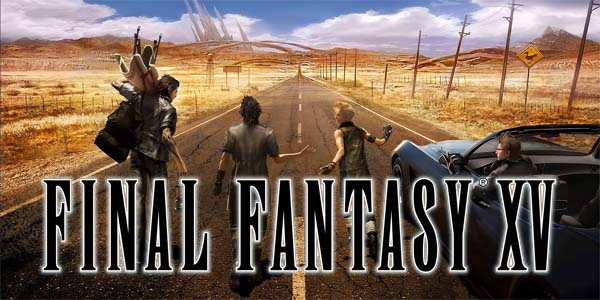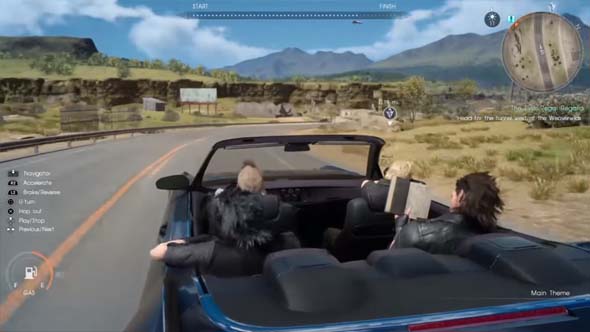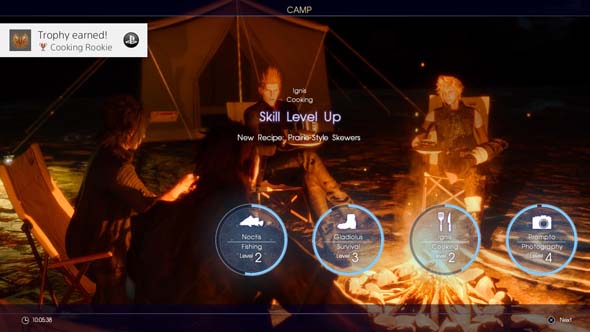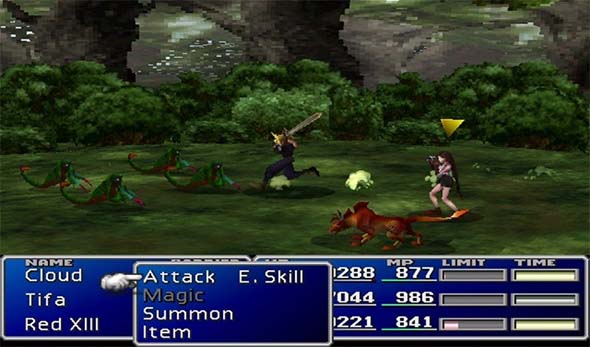I think the last few years have brought us to a bit of an inflection point for open world video games -- which I feel have been in kind of a rut for the better part of the last decade. Long-time readers of my personal blog will probably be very familiar with my complaints. The two core complaints that I've had with this particular game design paradigm are:
- That the map itself rarely feels meaningful as a game space, and instead serves primarily as a convoluted mission-select screen full of time-wasting filler content.
- That the sandboxy nature of the game design means that the world and narrative often feel stagnant (as if in a kind of "limbo").
This blog is mostly a transcript of a YouTube video that I posted.
These problems can be traced back at least to 2001's Grand Theft Auto III, which set many of the conventions of open world games for the next two decades. Companies from Ubisoft to Bethesda, and many others, would copy GTAIII's structure of going to a location on the map to trigger a mission in an aggressively linear, cinematic story, while spending free time on time-wasting filler content that did nothing to move the story forward.
Grand Theft Auto III set many of the standards
for open world games over the past 20 years.
Aside from Ubisoft's Assassin's Creed and Far Cry series, these problems have been present to varying degrees in everything from Skyrim to The Saboteur to Mad Max to Just Cause to The Amazing Spider-Man to Fallout 4 to Metal Gear Solid V, and many more. It started getting to the point that when I would see a game advertise the size of its map, I'd roll my eyes and lose interest. "Great, that's just more wasting my time walking from place to place with nothing meaningful or interesting or challenging to do."
Where you are on the map, where you're going, and how you get there was almost completely irrelevant in these games, which made the map itself (no matter how big and scenic it might be) feel mostly irrelevant. In fact, some games started introducing mechanics that let you bypass the map entirely by letting you fly, glide, or zipline to points of interest without having to engage with the space in between. In the case of Metal Gear Solid V's Afghanistan map, the roads are lined with sheer cliffs, funneling the player along linear paths from enemy outpost to enemy outpost, with practically nothing for you to do in the space between outposts. Even though the stealth action at those outposts was some of the best in the series, I couldn't help but think that Snake Eater provided a much more fulfilling experience of living within an open-ended game world.
I would roll my eyes whenever a game advertised the size of its map or hours of content.
The maps themselves weren't playspaces anymore; they were just the spaces in between towns, dungeons, and set pieces where the actual gameplay would take place. Just point in the direction of a waypoint and walk in a straight line, stopping every minute or so to pick up an umpteenth collectible, or climb an umpteenth tower, or sneak into an umpteenth enemy base and kill the umpteenth recycled mini-boss. Stop me if you've done all this before... A majority of the time with the game was just travelling around the map without any engagement in any gameplay systems or mechanics or strategies, and then playing some rote, recycled filler content to pass the time. And as the maps got bigger and bigger, the filler content just kept multiplying.
...
[More]
abf2cb68-ef06-4e1e-aa8a-4f1527dce74f|1|5.0
Tags:open world, sandbox, game design, map, traversal, obstacle, travel, exploration, cartography, geography, narrative, ludonarrative, Ubisoft, Bethesda, Assassin's Creed, Assassin's Creed IV: Black Flag, Final Fantasy XV, The Legend of Zelda: Breath of the Wild, Red Dead Redemption 2, Marvel's Spider-Man, Firewatch, Miasmata, Sunset Overdrive, Death Stranding, Shadow of the Colossus, Resident Evil

I really don't know what to make of Final Fantasy XV. On the one hand, the game is trying to do something new and kind of interesting with the long-stale open world formula. I desperately want to be able to celebrate the game for these new ideas. That being said, the game just completely blunders so much of its fundamental design, and it tramples on many of these promising new ideas by falling back on too many of the very same tropes that have killed so many other open world games.
The obvious common criticism of the game is that it's got too much of the player just sitting in the car waiting. You don't even have to drive the damned thing, as you can set one of the NPCs in your entourage to do all the driving for you. And even if you do decide to take the wheel, the car drives itself. You just press the gas, and the car automatically steers itself to stay on the road. You can't even turn off of the road even if you want to.
You know what? I'm actually OK with that.

I actually don't mind the long drives, as I can catch up on some reading along with Gladiolus
A nostalgic road trip adventure
You see, having such restrictive travel mechanics actually forces the player to think more about how you're going to navigate the world. While in the car, you are confined to the game's roads and highways. You can't just point the car directly at your objective marker and drive off-road in a straight line to get there. You're also limited to traveling during the daylight hours, and you have to make sure that you budget the time and money to stop for gas and lodgings. There's a genuine amount of logistical planning required for accomplishing virtually any task in this game. You have to think about traversing this world in the same manner that the characters would have to think about it! This is a role-playing game, after all, isn't it? So these travel mechanics are actually pretty clever ways of putting the player in a role-playing mindset and giving you a game to play when you're outside of combat.
I get the feeling that Square-Enix wanted Final Fantasy XV to emulate being on a road trip. You spend large chunks of time sitting in the car driving across the countryside, passing rest stops, scenic overlooks, and roadside diners. You stop every so often to admire the view, take a walk through nature, or chat with the locals. When the sun sets, you are pressured to find a motel to bunk in, or to set up a camp site if you happen to be on foot.
For brief periods of time, this game hits a very serene high in which you start to feel like you're really in this world and with these people, as they sit bored in the car, or eat dinner over a campfire while going over the photos that they took of the day's adventure. It's the same sort of feeling that No Man's Sky hits in its early hours, when you're still awestruck by the sheer size and scope of the new planets you set foot on. Having been someone who used to take annual road trips with my family to visit national parks around the country, seeing a video game try to simulate and systemize that activity (and the human bonding that it engenders) is genuinely endearing and makes me more than a little bit nostalgic.

This game makes me nostalgic for the summer camping trips of my youth.
Mundane video game adventure
But then, much like No Man's Sky, Final Fantasy XV shatters that experience by forcing you back into "video game land". It isn't the long stretches of non-interactive driving through a video game vacation that bothers me. Instead, I'm bothered by the sheer tediousness of the mundane fetch quests and busy-work that the game throws at you. You see, a road trip -- and an adventure in general -- only really works if you're always traveling towards a destination. This is a feeling that Final Fantasy X completely nailed!... [More]
8a140761-e4af-4f96-967f-0ee072bf1484|1|5.0
Tags:Final Fantasy, Final Fantasy XV, Square-Enix, RPG, JRPG, open world, road trip, camping, Regalia, car, driving, chocobo, Noctis, Ignis, Gladiolus, Prompto, recipe

Despite being great games, the character development systems of many Final Fantasy games have really weird qualities that put them at odds with the games' narratives. One of the things that separates games from other media such as books or movies is that games are interactive experiences. The best games typically have gameplay that informs story and / or a story that informs the gameplay. This is especially true of RPGs, which are generally designed entirely around their stories and characters.
While the combat and character development systems of most Final Fantasy games do have a basis in the game's narrative, some of the Final Fantasy games have gameplay systems that actually pull the player out of the story and create strong disconnects between the gameplay and the narrative.
Yet, we still love these games. That is either a testament to the overall quality of the games, or to the general gullibility of gamers.
Perhaps the two most popular Final Fantasy games are the worst offenders in terms of having gameplay mechanics that aren't well integrated into the narrative.
Final Fantasy VII is widely regarded as best game of the series, and it frequently appears on lists of "the Best Games Ever". Its story, characters, and locations have become iconic. And its primary character-development mechanic, materia, is generally well-received by fans and critics. The materia itself is even a functional object in the game world and an integral part of the plot, instead of just an abstract game mechanic.

All skills and abilities (except Limit Breaks) are granted by equipping materia,
making all character functionally almost identical.
However, this materia system does have one significant drawback: It severely limits the role of the characters in the actual gameplay.
From a gameplay perspective, the characters of Final Fantasy VII are mostly blank slates. The only mechanics that are unique to characters is their weapon classes and unique limit breaks. The weapons are mostly cosmetic, since the combat mechanics don't differentiate them much. There are slight variations in the number and arrangement of materia slots between characters' weapons, but these are minor differences. Limit breaks are infrequently used and are of little consequence ... [More]
ea7aa59c-7493-4967-ac9b-2c6f6f385c7c|1|5.0
Tags:Final Fantasy, Final Fantasy VII, Final Fantasy VIII, Final Fantasy IX, Final Fantasy X, Final Fantasy X-2, Final Fantasy XII, Final Fantasy XIII, Final Fantasy XV, materia, guardian force, sphere grid, dress sphere, job, level up, RPG, story, Squaresoft, Square-Enix
|

| 12 | | | | | | | 60 | | 11 | | | | | | | 55 | | 10 | | | | | | | 50 | | 09 | | | | | | | 45 | | 08 | | | | | | | 40 | | 07 | | | | | | | 35 | | 06 | | | | | | | 30 | | 05 | | | | | | | 25 | | 04 | | | | | | | 20 | | 03 | | | | | | | 15 | | 02 | | | | | | | 10 | | 01 | | | | | | | 05 |
|